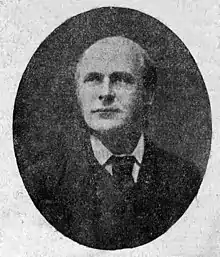The Lord Radstock | |
|---|---|
 | |
| Born | 10 April 1833 London, England |
| Died | 8 December 1913 (aged 80) Hôtel d'Jéna, Paris, France |
| Occupation | Missionary |
Granville Augustus William Waldegrave, 3rd Baron Radstock (10 April 1833 – 8 December 1913)[1] was a British missionary and a baron in the Peerage of Ireland.
Biography
Waldegrave was born in 1833, the only son of Granville Waldegrave, 2nd Baron Radstock and his wife Esther Caroline Paget. He became the 3rd Baron Radstock on the death of his father in 1857. On 25 April 1860, he was promoted to lieutenant colonel in the West Middlesex Volunteer Rifle Corps.[2] He resigned his commission at the end of October 1866.[3]
As a result of a spiritual crisis during the Crimean War, Radstock with his wife joined the Plymouth brothers' "free" church in Bristol. It was a community of the so-called Open Brethren, led by prominent theologian and missionary George Müller.
Radstock was a missionary during the "Great Russian Awakening", preaching and evangelising among members of the Russian aristocracy.[4] In 1874, he travelled to St Petersburg as part of his missionary work, repeating the trips in 1875–76, and in 1878.[1] During this period, Radstock's activities attracted the attention of the writer Leo Tolstoy, who based the character Sir John on Radstock in his novel Anna Karenina.[5] Radstock's missionary efforts met with much success before he was expelled from Russia in 1878.[6]
Radstock later visited Sweden and Denmark, preaching at evangelistic services. He continued to maintain correspondence for many years with Sophia of Nassau, Queen of Sweden and Norway, and Louise, later Queen of Denmark.[4]
Marriage and children
Radstock married Susan Charlotte Calcraft (1833–1892) on 16 July 1858 in Holy Trinity Church, Marylebone, London. She was the youngest daughter of John Hales Calcraft, MP for Wareham, and Lady Caroline Montagu, daughter of William Montagu, 5th Duke of Manchester.[1] In 1889, they acquired the Mayfield estate in Weston, Southampton.[7]
Lord and Lady Radstock had nine children:[8]
- Granville George Waldegrave, 4th Baron Radstock (born 1 September 1859, died 2 April 1937)
- Hon Katherine Waldegrave (born 1860, died 4 December 1874)
- Hon Edith Caroline Waldegrave (born 1862, died 15 November 1925)
- Hon Mabel Waldegrave (born 1863, died 12 December 1929)
- Hon Constance Waldegrave (born 1865, died 19 June 1945)
- An unnamed son (born and died 1866)
- Montague Waldegrave, 5th Baron Radstock (born 15 July 1867, died 17 September 1953)
- Hon John Waldegrave (born 30 December 1868, died 4 April 1901)
- Hon Mary Waldegrave (born 1870)
Death
Lord Radstock died in Paris on 8 December 1913 and was succeeded in the peerage by his eldest son, Granville.[9]
Arms
  |
|
References
- 1 2 3 Harold H. Rowdon, "Waldegrave, Granville Augustus William, third Baron Radstock (1833–1913)", Oxford Dictionary of National Biography, Oxford University Press, 2004; online edition, May 2006, accessed 19 August 2012 (subscription or UK public library membership required)
- ↑ "No. 22383". The London Gazette. 8 May 1860. p. 1744.
- ↑ "No. 23182". The London Gazette. 9 November 1866. p. 5899.
- 1 2 Fountain 1988.
- ↑ Fountain 1988, p. 35.
- ↑ Fountain 1988, pp. 38–39.
- ↑ Southampton City Council
- ↑ Mosley, Charles, editor. Burke's Peerage, Baronetage & Knightage, 107th edition, 3 volumes. Wilmington, Delaware, U.S.A.: Burke's Peerage (Genealogical Books) Ltd, 2003
- ↑ "Lord Radstock". The Times. 9 December 1913. p. 11. Retrieved 18 April 2020 – via Newspapers.com.
- ↑ Burke's Peerage. 1949.
Sources
- Fountain, David G. (1988). Lord Radstock and the Russian Awakening. Southampton: Mayflower Christian Books. ISBN 978-0-907821-04-5.
Further reading
- Heier, Edmund (1971). Religious schism in the Russian aristocracy 1860-1900: Radstockism and Pashkovism. The Hague: Nijhoff. ISBN 978-9024750146.